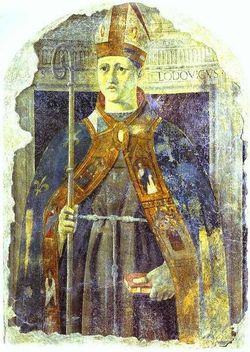Saint Louis of Toulouse
| Saint Louis of Toulouse | |
|---|---|

Saint Louis of Toulouse, by Piero della Francesca
|
|
| Born |
February 9, 1274 Brignoles, France |
| Died | August 19, 1297 (aged 23) Brignoles, France |
| Venerated in | Roman Catholic Church |
| Canonized | April 7, 1317 by John XXII |
| Major shrine | Valencia |
| Feast | 19 August |
| Attributes | boy bishop, often with a discarded crown by his feet; represented vested in pontifical garments and holding a book and a crosier |
| Patronage | Valencia; Mission San Luis Obispo de Tolosa |
Saint Louis of Toulouse (9 February 1274 – 19 August 1297) was a cadet of the royal French house of Anjou who was made a Catholic bishop.
He was born in Brignoles, Provence, (or in Italy, at Nocera, where he spent a part of his early life), the second son of Charles of Anjou "the Lame" and Maria Arpad of Hungary, daughter of King Stephen V of Hungary. His father was appointed King of Naples by Pope Clement IV, the former secretary to Louis IX of France. The boy was himself a nephew of Saint Louis (Louis IX) and of Mary of Hungary (her great-aunt being Saint Elizabeth of Hungary), and also the aunt of Saint Louis' mother was Saint Margaret of Hungary.
When Charles II of Naples was taken prisoner in Italy, during the war with King Peter III of Aragon that followed the Sicilian Vespers, he obtained his own freedom by giving over his three sons as hostages. The boys were taken to Catalonia, where they were placed under the care of Franciscan friars for their education and held for seven years. Impressed by one of the friars in particular, Arnauld de Villenueve, Louis took up the study of philosophy and theology. Though still held in captivity, Louis was made archbishop of Lyon as soon as he reached his majority. When his older brother died of plague in 1295, Louis also became heir to his father's secular titles; however, when he was freed that same year, Louis went to Rome and gave up all claims to his royal inheritance in favor of his brother Robert of Anjou and announced that instead he would take the Franciscan vows of poverty, chastity, and obedience.
...
Wikipedia
